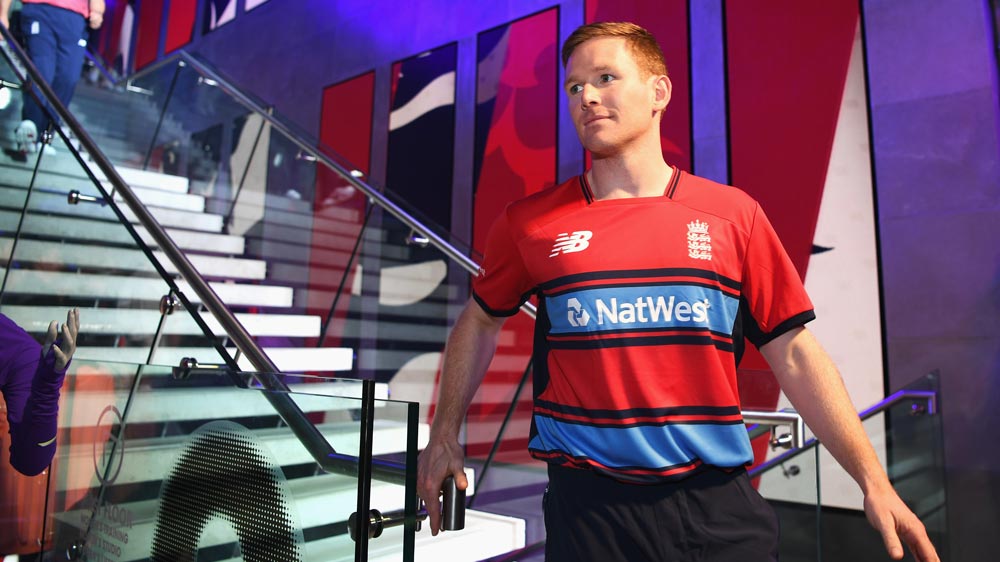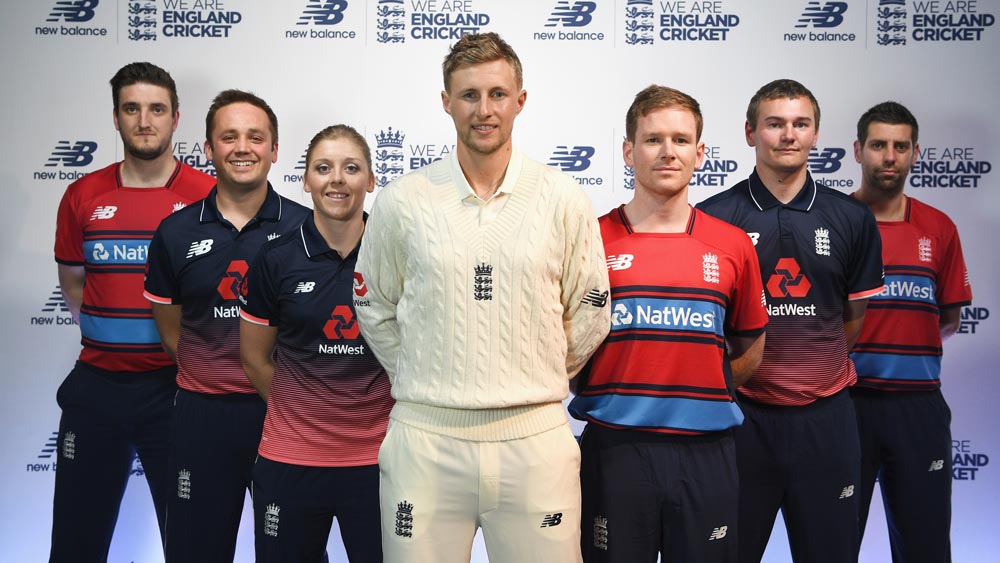England Cricket Captain Eoin Morgan On The Most Powerful Way To Lead
What he learned from playing alongside Andrew Strauss

The transformation of England’s limited-over cricket teams over the past couple of years has been remarkable. After a disastrous one-day international (ODI) World Cup performance in 2015, England threw caution to the wind to become one of the most attacking and effective sides in the world. They even came within a whisker of winning the Twenty20 World Cup in 2016.
England’s exciting young team now have their sights set on winning the ICC Champions Trophy in the UK this summer. Spearheading the charge is Eoin Morgan, captain of the England ODI and T20 sides.
Cricket captains have a far bigger role than skippers in most sports, so we spoke to Morgan about his style of leadership at the launch of the new England kit at the New Balance store in London.
Have you always wanted to be a captain?
I captained a lot growing up and when I first came to Middlesex I captained a lot of second-team cricket, but to be honest I don’t think you should aspire to be a captain. I think you should naturally be recognised as the leader within the group. As a senior player and leader within the team it was something that fell to me.
Which leaders on the cricket pitch do you admire?
I gained experience under terrific captains, Andrew Strauss and Alastair Cook.
Andrew Strauss always set the tone by example. He was the first to pick everybody up or to do something himself to inspire guys around him. I think it’s the most powerful way to lead.
There are plenty of big characters in the England team. How do you approach captaining people with big egos?
We’ve always embraced guys being themselves – whether that means they have big egos, small egos or no ego at all. The challenge as the leader of a team is to make sure the guys can be themselves and perform on the field. Cricket is a mentally-driven sport and it’s important the bit between players’ ears is right. And having a team goal that people buy into is also important.
Sign up for workout ideas, training advice, reviews of the latest gear and more.
Test captain Joe Root is also part of the ODI and T20 teams – is it hard captaining a side with another captain in it?
I think it’s great to have a guy like Joe in our white ball team. Not simply because of the weight of runs he scores but having a guy with new ideas to talk to. Jos [Buttler] is our vice-captain and I go to him quite a lot – he has the best view in the house behind the stumps and he has a lot to experience and other qualities to contribute. Joe is no different.
Can every player chip in with ideas when they like?
Yeah. Some do it more than others – I think you have to have that confidence and experience behind you. You don’t get guys jumping around with ideas all the time – that would be unnecessary and a bit tiring really, but we do have a lot of guys who have played enough cricket to either state the obvious or state something that we’re missing out on.
How important is man-management to the captaincy?
Certainly one way I lead is to deal with guys on an individual basis. Everybody is clear on their role within the team. Everything is transparent. They know what the goal is, what the target is.
Then collectively we get together as a group and that message is reiterated so there’s no confusion. When we’re trying to play positive cricket like we are there has to be no room for doubt. When doubt creeps in it can create errors and misjudgements. We try to keep things as clear as possible.
Do you ever envy a football captain, who does much less?
No, I don’t think so. I think football is completely different, although I can’t say a huge amount because I’ve never been a professional football captain! From the outside looking in, they take a huge amount of flak and I’m not sure how much of the decision-making they do. It’s hard in a way, because you’re given the captaincy, but how much input you have I don’t know. That’s difficult in itself.
But you prefer having the control of a cricket captain?
I think so. Certainly one thing that I’ve been able to bring to the side is when I’ve felt things have gone wrong for us, I’ve been able to implement what I think is right.
We’ve complicated it a lot in the past. With the players we have at the moment we don’t need to overcomplicate things. The ambition and the hunger is there within the team. I think that’s been proven over the past two years with the performances the guys have put in.
How do you explain the turnaround in fortunes?
I think it was a combination of a few things. International cricket is high-intensity, but if you sweep everything aside it’s as simple as every normal game of cricket. Instilling that within the guys and giving them freedom was important. We wanted guys to go out and make mistakes, go out and get caught on the boundary, go out and do something stupid. We’ve seen them do things for their county the whole time so we didn’t mind.
Look at Jason Roy in the first ODI against New Zealand [in 2015]. First ball he tried to drive and got caught at point, but he’s smashed it for four nine times out of ten when playing for Surrey. Whatever happens happens – we encourage him to play his own game.
RECOMMENDED: Northern Ireland Manager Michael O’Neill on Motivation
Modern sport seem to change quicker than ever before. Is that a big responsibility that falls to you as captain – to keep track of trends in the game?
Definitely. One of the big changing factors for us is guys going to play in world tournaments [such as the Indian Premier League and Big Bash]. We’ve been kept to our own tournaments and it has inhibited our development as individuals. England had a record number of people playing in the Big Bash this year with seven, same in the IPL with eight. Continuing to get guys exposure to world tournaments will do us a world of favours.
Recently there was a beautiful example – Ben Stokes scored a hundred in an IPL game. That must give him an unbelievable amount of confidence and it means other people start looking at English players and asking “what are they doing?” as opposed to us following trends.
Eoin Morgan was speaking at the launch of England's New Balance kits. For more information and to buy the kit, head to newbalance.co.uk


Nick Harris-Fry is a journalist who has been covering health and fitness since 2015. Nick is an avid runner, covering 70-110km a week, which gives him ample opportunity to test a wide range of running shoes and running gear. He is also the chief tester for fitness trackers and running watches, treadmills and exercise bikes, and workout headphones.
